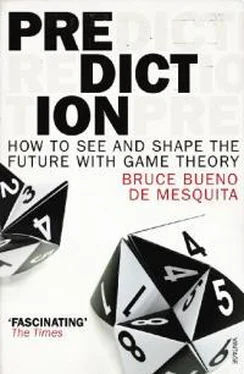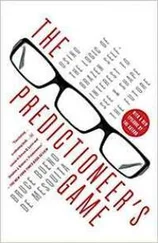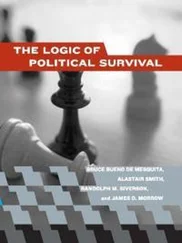Even with my conservative calculations, PA revenue skyrockets and the Israelis lose nothing. Similar gains can be realized if the Israelis control actions by settlers and other groups that may be inclined to foment trouble with Palestinians, leading inevitably to retaliatory strikes back and forth. The governing parties on each side should have the right incentives to prevent that result.
A failure to engage in effective counterterror or proper policing leaves the status quo in place. Successful counterterrorist policies and effective policing enrich both sides without either side’s having to cooperate directly with the other. Of course, it is likely that collaborative efforts between the intelligence services of each side would emerge to enhance the income of both. There is no mechanism in this proposal by which one side can improve these revenues without also improving the revenues flowing to the other side. That is why the plan is self-enforcing and potentially equally beneficial to both sides.
Obviously, the Israeli-Palestinian conflict is not only about their respective economies. And equally obviously, many economic incentive approaches have been proposed before, going back at least to the time of Winston Churchill. However, earlier economic schemes assumed investment strategies that required mutual coordination and cooperation, and gave the investing side—the Israelis—the ability to pull the plug if they didn’t get what they wanted. Such approaches fail to assign equal responsibility to the Palestinians and the Israelis for enforcing peace or for punishing violators of the peace. Such approaches also foster a fear of economic dependence in Palestinians employed by Israeli-funded businesses. Sharing tourist tax revenues has none of these limitations. Incentives are symmetric, and the responsibility for enforcement is also symmetric. Violations of the peace by either side mean a loss of revenue for both sides.
Not only is tourism important for the future PA economy, but the Palestinian Authority’s leaders have also shown that they can and will control threats to the peace that directly impact some forms of income. For example, in the case of the gambling casino in Jericho controlled by the Palestinians, we know that they have successfully secured the road to the casino. That road to casino riches experienced minimal security threats even at the height of the intifada. By securing the road, the Palestinians also ensured the flow of revenues from it. Additionally, we know that the least developed tourist areas in Jerusalem are in the Palestinian quarters, with a similar pattern of underdevelopment of tourist facilities throughout the Palestinian Authority’s territory and in areas in Israel dominated by Palestinian residents. With peace we can expect that international hotel chains, restaurants, boutiques, and other enterprises catering to the tourist trade will grow disproportionately in the underdeveloped areas, thereby making the tie between tourism-generated prosperity and peace all but self-funded in the mid-to long term.
Finally, sharing tourist tax revenue (recalling that what is shared will by its nature be minimal if there is no peace) will promote a “confidence building” step that requires no trust on either side. It also should promote more counterterrorism efforts from the Palestinian side and probably fewer new settlers on the Israeli side. If this revenue-sharing scheme helps pacify the area and helps promote effective counterterrorism, then the door is opened for more encompassing negotiations over fundamental issues. Terrorist movements, once destroyed, rarely reemerge. The revenue-sharing concept can be a way to move the “peace process” in a positive direction without relying on mutual trust, or even mutual contact, for the time being.
If religion truly dominates the divide between Israelis and Palestinians, as many believe, then the tourist tax plan will fail to promote peace, but it will reveal who the main impediments to peace truly are. Identifying who exactly is willing to sacrifice their own people’s economic and social well-being for religious or other reasons will make it easier to know with whom to negotiate and with whom it is a waste of time. That, in turn, can open the way for fragmenting resistance to peace and make subsequent counterterror efforts more focused and more effective. Either way, such a self-enforcing quest for peace is unlikely to make the situation worse, and has a good chance of making it better.
Some people resist ideas such as my tourist-tax plan because they are sure they can’t work. They think that the cultural divide between Israelis and Palestinians or Jews and Muslims is just too deep to respond to ordinary economic incentives. They think there is a culture of violence that cannot be overcome. They think this even as they see that Northern Ireland is no longer racked by daily explosions and that tens of thousands of former insurgents in Iraq are sticking to their new role as Concerned Local Citizens. Maybe they are right in the case of Palestinians and Israelis, but history does not support their assumption.
Throughout the long history of Muslim domination of the Middle East until roughly the start of the Second World War, Jews lived better and more freely among Muslims than almost anyplace else in the world. When the so-called Moors controlled Spain, Jews enjoyed the tolerance of the Muslim leadership. That tolerance came crashing down when Ferdinand and Isabella unified Spain under Catholic rule. The basis of Palestinian-Israeli conflict resides, at least for many, in economics, not religion. Religion is a politically useful and easy organizing principle that unscrupulous people use to marshal support, but it is not what the fight was or is primarily about. The fight is about land in a locale where, for most, the economy was historically tied to owning property, just as it is in all traditional societies. The economies in the territories lived in and controlled by Israeli and Palestinians still rely significantly on land, but not nearly as much as they did decades ago. Israel has a modern economy in which agriculture plays a much altered role. The Palestinians aspire to a significant degree to have a modern, service-based economy in tourism. These are the conditions that are ripe for a self-enforcing incentive plan.
Naysayers are too quick to equate what they see people do with what they think their core values are. Because terrorist acts seem so extreme, so fanatical, so incomprehensible, many of us are quick to assume that terrorists are a breed apart. They are thought of as people who cannot and will not respond to rational arguments. And yet we already know that even al-Qaeda insurgents in Iraq can be induced to change their ways for just ten dollars a day. Put the history of Jewish-Muslim relations together with the responsiveness of former insurgents to modest economic rewards, and it’s hard to see the downside to trying a new economic approach, especially one that promises virtually no economic downside for one party and huge gains for the other. As the old anti-war song says, “Give peace a chance.”
Even those who absolutely cannot believe that Palestinians or Israelis would value economic incentives over religious principles should want this tourism-incentive plan tried out. Why? Because it has a “hidden hand” benefit alluded to earlier that directly addresses the concern of naysayers. I think we can all agree that there are some hard-liners on the Palestinian side who don’t care about building a strong Palestinian economy, and others on the Israeli side who are certain God did not intend the land to be occupied by anyone other than Jews. These hard-liners will do whatever they can to thwart peace. They will foment violence to prevent tourists from coming. But we should also be able to agree that there are at least some pragmatists on each side as well. The revenue-sharing strategy will ensure that the pragmatists have a strong incentive to identify hard-liners and fight them. The pragmatists will have an incentive that they do not currently have to provide counterterrorism intelligence to their governments in order to ferret out the hard-liners and stop them from interfering with the massive economic improvements promised by this plan. Thus, it should become easier to find and punish the hard-liners, thereby strengthening the hand of pragmatists on both sides. That’s something that should appeal to those who fear the power of the hard-liners.
Читать дальше











